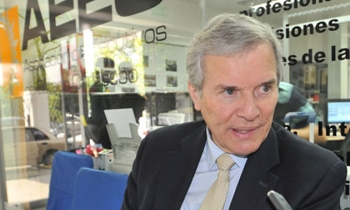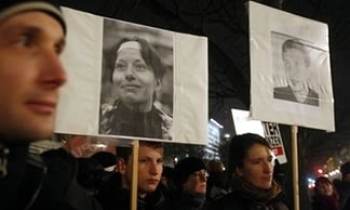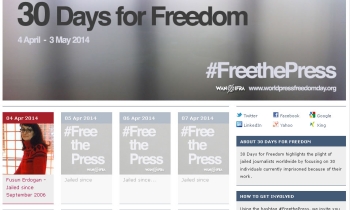A detailed indictment used to charge leading journalist Moussa Kaka with “complicity in a conspiracy against state authority†is being seen as “inconsistent and absurd.†The manager of privately-owned Radio Saraouniya and correspondent of Radio France Internationale and Reporters sans Frontières (RSF), Kaka was arrested on 20 September.
“The details of the case against him are inconsistent and in some cases mendacious, while overall, what he is alleged to have done are normal activities for a brave and rigorous journalist such as Kaka,†RSF reacted.
“It seems that above all they are trying to punish a journalist who dared to shine light on developments which the government wanted to pass off as criminal activity of little importance, but which in reality point to a serious political crisis,†it said.
“Moussa Kaka has been repeatedly harassed by the government because of his coverage of the Tuareg conflict,†Committee to Protect Journalists (CPJ) Executive Director Joel Simon said. “The government has made serious accusations that Kaka and the rebels conspired to exchange money and that he was otherwise complicit in the rebellion. They must substantiate these charges or withdraw them immediately. He should not, under any circumstances, be held in jail regardless.â€
After being incarcerated in Niamey prison without being told why, as required by the law, Kaka was finally brought Wednesday before the state prosecutor, who told him he was charged with “complicity in a conspiracy against state authority†for being in frequent contact with the Tuareg Rebels of the Niger People’s Movement for Justice (MNJ) and with one of its leaders in particular, Agali Alambo. The charge is based on an indictment of several pages in length, much of consisting of details of his tapped phone conversations.
Calling Kaka a “banditâ€â€”the government’s term for the rebels— “under the guise of a journalist,†government spokesman Ben Omar Mohamed told CPJ the accusations were not linked to journalism.
Ever since MNJ emerged in the north of Niger in February, Kaka has reported on its demands and its armed clashes with government forces. Regarded as one of the country’s best journalists, he obtained exclusive interviews with MNJ leaders and photos of events in the field.
In an unprecedented televised news conference the day after Kaka’s arrest, Niamey prosecutor Adama Harouna accused him of “connivance†without offering any credible evidence. The accusation of “violating state security†originally mentioned by Harouna was not included in the formal indictment. Kaka’s lawyer, Moussa Coulibaly, said Kaka regarded all the accusations as a fabrication and rejected them outright.
Police arrested Kaka, director general of the private, nationwide broadcasting network Radio Saraounya and a correspondent, on Thursday last in his Saraounya offices, searched his residence, and seized a draft of a report he filed for RFI, according to his wife, Jamila Souley, director of Saraounya’s Niamey station. A day later, they searched Kaka’s offices and confiscated his personal computer, according to Boubacar Diallo, president of the Niger Association of Independent Press Editors, known as ANEPI.
Gendarmes escorted Kaka late Monday afternoon to his arraignment at a court in the capital, Niamey, where more than 20 journalists of the foreign and local media had gathered since the morning, Reuters correspondent Abdoulaye Massalatchi told CPJ. Kaka was later transferred to Niamey’s prison as the arraignment was postponed to Tuesday, he said.
Kaka, known for his exclusive coverage of several Tuareg rebellions since the 1990s, had been previously jailed in 2004, and the target of government death threats recently for his work. Last month, authorities declared a three-month state of alert around the ancient northern Saharan trading town of Agadez, granting security forces blanket powers of arrest and detention in response to attacks by Tuareg fighters since February, according to news reports. At least 45 government soldiers were killed and dozens more kidnapped in the attacks.
Media coverage of deadly attacks by Tuareg fighters this year led authorities to suspend RFI and a private newspaper, as well as ban live debates on the rebellion, according to CPJ research. Yet the rebels continue to make statements to the media via satellite phone, its representatives in Europe and its website.









